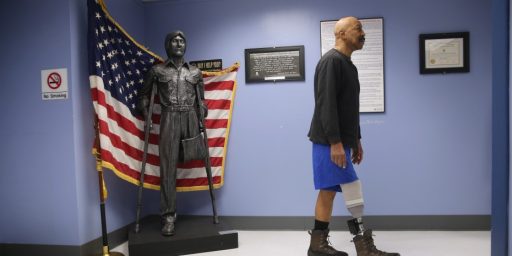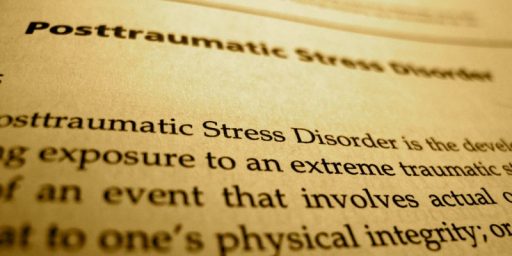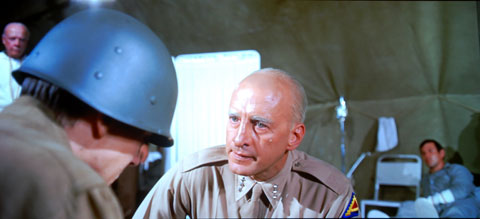Iraq War May Add Stress for Past Vets
WaPo fronts a report that Vietnam vets have been really stressed out since the Iraq War started.
More than 30 years after their war ended, thousands of Vietnam veterans are seeking help for post-traumatic stress disorder, and experts say one reason appears to be harrowing images of combat in Iraq. Figures from the Department of Veterans Affairs show that PTSD disability-compensation cases have nearly doubled since 2000, to an all-time high of more than 260,000. The biggest bulge has come since 2003, when war started in Iraq.
Experts say that, although several factors may be at work in the burgeoning caseload, many veterans of past wars reexperience their own trauma as they watch televised images of U.S. troops in combat and read each new accounting of the dead. “It so directly parallels what happened to Vietnam veterans,” said Raymond M. Scurfield of the University of Southern Mississippi’s Gulf Coast campus, who worked with the disorder at VA for more than 20 years and has written two books on the subject. “The war has to be triggering their issues. They’re almost the same issues.”
At VA, officials said the Iraq war is probably a contributing factor in the rise in cases, although they said they have conducted no formal studies.
Cori Dauber notes that it’s not the war, it’s press coverage of it, that’s increasing the vets’ exposure to war stress. Blue Crab Boulevard agrees, adding, “Maybe the veterans are watching the media trying to do the same thing that was done to them 30 years ago. Maybe they are sickened by watching the media and the left trying their best to lose this war like they lost Vietnam.”
If one wades further into the article, though, a far different explanation is proferred:
VA officials said other reasons for the surge in cases may include a lessening of the stigma associated with PTSD and the aging of the Vietnam generation — explanations that veterans groups also suggest. PTSD is better understood than it once was, said Paul Sullivan, director of programs for the group Veterans for America. “The veterans are more willing to accept a diagnosis of PTSD,” he said, “and the VA is more willing to make it.”
[…]
PTSD has become a volatile topic lately, with some skeptics questioning whether the rise in claims is driven by overdiagnosis or by financial motives. A report last week from the Institute of Medicine, part of the National Academies, concluded that “PTSD is a well characterized medical disorder” for which “all veterans deployed to a war zone are at risk.” VA’s growing PTSD caseload became an issue last August, when the agency announced a new review of 72,000 PTSD compensation cases, expressing concerns about errors and a lack of evidence. That probe was dropped after a sample of 2,100 cases turned up no instances of fraud.
Still, some experts are not convinced that the Iraq war has driven up the caseload. “I’m skeptical that it accounts for a broad swath of this phenomenon,” said psychiatrist Sally Satel, a resident scholar at the American Enterprise Institute. “These men have had deaths in their families, they had all kinds of tragedies over 30 years that surely affected them emotionally but they coped with.”
It may simply be that, as these men are reaching retirement age, they’re looking to increase their benefits. They’ve got plenty of ailments, many of which could plausibly be tied to their Vietnam service (Agent Orange, PTSD, etc.) and are petititioning to see if they qualify.
War is an awful thing, especially for an infantryman, and jungle and anti-guerrilla combat is especially horrific. Yet, most Vietnam veterans, like those who slogged through our other wars, have managed to adjust to the real world just fine. Certainly, watching the news decades after coming home is unlikely to be sending tens of thousands of these men over the edge.






James you may be correct about the motivation for these claims for benefits. But still, the medical problems people face as they get older are real.
I have always thought that we should have just one system, medicare, to cover everyone, veteran and non veteral alike. Instead of the various ‘interests’ fighting for more for themselves at the expense of others, this would assure that all the various ‘interests’ are aligned to insist on good medical care for all.
I’m sure that some of the cases will turn out to be, umm, less-than-real; but some of them, too, will turn out to be that the demonstrations and media coverage has tugged open a long and slowly festering psychological wound that can now be healed.
War is Hell.
I think you might have hit the nail on the head with veteran’s interest in their benefits. The more DOD has to put out in GWOT funds the less that can go to increase VA benefits and in fact VA benefits are going to have to decrease. It has been made quite clear in the recent congressional marks that the well is running dry for DOD.
The thought running through most of their minds is get in now, so you can be grandfathered and not hurt by future year VA Cuts.